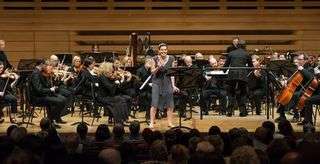|
Back
A brash century so far? Toronto
Koerner Hall
05/24/2017 -
Brian Current: Naka – The Seven Heavenly Halls
Matthew Aucoin: The Orphic Moment
Samy Moussa: Kammerkonzert
Unsuk Chin snagS&Snarls
Emily D’Angelo (mezzo-soprano), Andrew Haji (tenor), Richard Van Camp (narrator)
Elmer Iseler Singers, 21C Ensemble, Lydia Adams (director), Canadian Opera Company Orchestra, Johannes Debus (conductor)

E. D’Angelo (© Lisa Sakulansky)
The opening concert of 21C, the Royal Conservatory’s fifth festival of 21st century music, turned out to be a major blockbuster.
The evening opened with a prayer accompanied by drumming performed by four men from the Dene (pronounced Denay) community of Canada’s Northwest Territories, followed by a performance by three women of O Canada sung in the Tlicho language of the area.
This helped set the stage for the first item on the program, Brian Current’s Naka (“Northern Lights”) with a text in English and Tlicho by Dene author Richard Van Camp. It begins with whispers from the 25-voice choir then swells up into intense clouds of sound while Mr. Van Camp narrates. The Tlicho language uses sounds that can’t be written using the conventional Roman alphabet (the choir members were coached by Tlicho elder Rosa Mantla). It was rather a noisy evocation of the silent arctic lights, but the intention seems to have been to evoke the wonder and excitement at seeing the lights.
By the way, Naka is just one of 12 world premieres among the 60 works the festival will be presenting over its busy five-day run. It is actually the third section of a seven-part work in progress, The River of Light, based on texts from cultures around the world.
This was followed by US composer’s Matthew Aucoin’s The Orphic Moment, his chilling treatment of the Orpheus myth. The composer’s notes elucidate his interpretation of Orpheus’s failure to obey the decree of silence, thus losing his beloved Euridice a second time: since Orpheus was inspired to create such tragically beautiful music after Euridice’s death by snake-bite, he figures that losing her a second time would inspire even more profound utterance. Therefore he deliberately disobeys in order to cause her death. Orpheus’s ruminations are voiced by a mezzo-soprano (Emily D’Angelo) while 15 orchestral players are employed to wonderful, haunting effect, with a violinist (concertmaster Marie Bérard) representing the plaintive Euridice. The work contains a lot of dramatic tension and its lyric expressiveness is truly a gift for the singer. Ms D’Angelo further cements her reputation as a fast-rising star.
The only fully-orchestral work of the evening was Samy Moussa’s Kammerkonzert dating from 2006 when the composer, now director of Munich’s INDEX Ensemble, was a 22-year-old student at the Université de Montréal. As Max Urbino’s notes explain, the term kammerkonzert denotes a “chamber concerto”. A better title might have been Grosses Kammerkonzert because what we have is a major workout for whole orchestra (some 50 players on this occasion), beginning with loud bangs and a low portentous groan. What ensues are long lines and swoops of sound with a variety of colour arising from unusual groupings of instruments. Energy arises from occasional pulsing episodes rather then tempo per se. It comes across as a statement from an exuberant young man exploring the sonic possibilities of a new (to him) instrument, the orchestra. It isn’t the last word on anything but it is an exhilarating display from one of the country’s most intriguing composers.
Korean composer Unsuk Chin’s snagS&Snarls proved to be another showcase for Emily D’Angelo, this time showing her mischievous side. The work consists of five songs to texts from or based on the writings of Lewis Carroll. Four of the songs were used in Chin’s opera Alice in Wonderland, premiered by the Bavarian State Opera in 2007. Each song has a strikingly individual profile, from the tumbling cadences of “Alice - Acrostic”, the plunging and soaring “Who in the world am I?”, the elongated syllables of “The Tale-Tail of the Mouse”, the warlike anti-lullaby “Speak roughly to your little boy”, and the frenetic mad dash of “Twinkle, twinkle little star”.
The evening concluded with Brian Current’s The Seven Heavenly Halls, which will form Part I of The River of Light. The text is taken from the Zohar, a medieval book that is a major part of the Jewish mystical Kabbalah, adapted by Anton Piatigorsky from a translation by Yehoshua Rosenthal. It is in 10 parts and last about 20 minutes. The music from the start evokes an elevated, ecstatic state of being as the guide (tenor Andrew Haji) describes the seven halls, each more full of colour and light than the last, as orchestra and chorus declaim in a style I can only describe as neo-Elgarian. A brief passage echoes traditional Hebraic melisma.
Much to my amazement, Current does manage to build it even bigger toward the end with a mighty climax (“Blessed be He!” from the choir) that throws down a challenge to Mahler’s 8th Symphony. But the final lines, “Here is the mystery of mysteries”, are very quiet.
Mr. Haji has one of the loveliest lyric tenor voices around and does a terrific job, even when the part demands helden utterance.
The Seven Heavenly Halls was premiered in 2016 by the Montreal Symphony Orchestra. It will certainly provide a sit-up-and-listen introduction to the seven-part completed work.
The sheer volume of much of the evening’s music came close to overwhelming the acoustic properties of the 1100-seat hall. These brash works would easily make an effect in larger halls. The music director of the Canadian Opera Company, Johannes Debus, managed the large, varied forces with his usual astuteness.
Michael Johnson
|